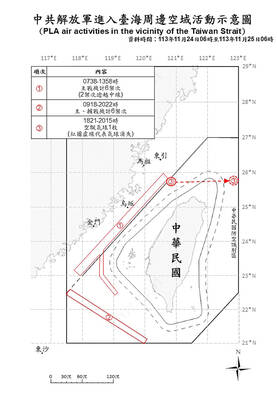The military is trying to move forward a proposal to purchase submarines from the US by endorsing a deal that could placate opposition lawmakers, who have criticized the subs as overly expensive.
In a special report released yesterday, the Ministry of National Defense threw its weight behind a proposal championed by US Representative Rob Simmons, who recently traveled to Taiwan seeking to help overcome the impasse.
During a Congressional hearing last week, the Connecticut Republican made no secret of the fact that one of his ultimate goals was to try to find work for his constituency, which includes the shipbuilding firm Electric Boat.
"In my recent visit to Taiwan, they indicated that they were balking at the sale price of US$12 billion, without knowing what they looked like, what they were designed to do and what in fact the Taiwanese were getting for that sale price," Simmons told a House Armed Services naval subcommittee on Thursday.
"And I suggested breaking the project out into pieces, most specifically, US$225 million for complete design, conceptual through final detail design, at which point the decision could be made as to whether to proceed with production," Simmons said.
The proposal outlined by the ministry yesterday would break the purchase into two stages. In the first stage, the ministry said it would appropriate US$200 million as part of a supplementary budget. This budget would be used to cover bidding and developing a design for the submarines.
The second stage would require appropriating a budget for the actual construction of the submarines.
According to figures released by the ministry, a single diesel-electric submarine produced in the US could be acquired for approximately US$657 million.
It said this figure was based on an independent price assessment for a 2,000-tonne vessel. If this figure were accurate, it would mean that eight subs would cost a total of US$5.26 billion.
The assessment was contained in a report on arms purchases and a review on current military combat readiness, which was delivered to the Legislative Yuan's National Defense Committee.
The ministry's report said that because the US has not built conventionally powered submarines for several years, it was difficult to determine the final cost of procuring submarines until a design had been decided upon.
It also noted the difficulties of trying to procure submarines from another country, given Taiwan's relative diplomatic isolation.
However, the support of the military does not guarantee that the sub deal will move forward. The opposition parties have blocked a special military budget proposal that included the submarines more than 45 times, despite it having undergone a series of price cuts and reconfigurations.
The US Navy has also been reported as opposing the submarine deal, but Rear Admiral Joseph Walsh, the US Navy's director of submarine warfare, tried to put these fears to rest when confronted by Simmons.
"The officials I talked to in Taiwan, from President Chen Shui-bian [
"Sir, to answer your question, no, the navy has not been dragging its feet on the procurement of eight diesel submarines by Taiwan. We in the navy support the president's initiative to sell eight diesel submarines to Taiwan," Walsh replied, later adding, "Whether Taiwan would actually want to do that [agree to breaking up the deal] and do a two-step process obviously is up to the people of Taiwan to decide."
"I thank you for that answer. [Taiwan] would prefer that," Simmons said. "Just the way members of this subcommittee, members of our Congress, like to see what we're buying with the taxpayers' dollars, [Taiwanese lawmakers] like to see what they're buying with their taxpayers' dollars."

Taiwan’s passport ranked 34th in the world, with access to 141 visa-free destinations, according to the latest update to the Henley Passport Index released today. The index put together by Henley & Partners ranks 199 passports globally based on the number of destinations holders can access without a visa out of 227, and is updated monthly. The 141 visa-free destinations for Taiwanese passport holders are a slight decrease from last year, when holders had access to 145 destinations. Botswana and Columbia are among the countries that have recently ended visa-free status for Taiwanese after “bowing to pressure from the Chinese government,” the Ministry

Theaters and institutions in Taiwan have received 28 threatening e-mails, including bomb threats, since a documentary critical of China began being screened across the nation last month, the National Security Bureau said yesterday. The actions are part of China’s attempts to undermine Taiwan’s sovereignty, it said. State Organs (國有器官) documents allegations that Chinese government officials engage in organ harvesting and other illegal activities. From last month to Friday last week, 28 incidents have been reported of theaters or institutions receiving threats, including bomb and shooting threats, if they did not stop showing the documentary, the bureau said. Although the threats were not carried out,

HEALTHCARE: Following a 2022 Constitutional Court ruling, Taiwanese traveling overseas for six months would no longer be able to suspend their insurance Measures allowing people to suspend National Health Insurance (NHI) services if they plan to leave the country for six months would be abolished starting Dec. 23, NHIA Director-General Shih Chung-liang (石崇良) said yesterday. The decision followed the Constitutional Court’s ruling in 2022 that the regulation was unconstitutional and that it would invalidate the regulation automatically unless the NHIA amended it to conform with the Constitution. The agency would amend the regulations to remove the articles and sections that allow the suspension of NHI services, and also introduce provisional clauses for those who suspended their NHI services before Dec. 23, Shih said. According to

‘GRAY ZONE’ TACTICS: China continues to build up its military capacity while regularly deploying jets and warships around Taiwan, with the latest balloon spotted on Sunday The US is drawing up contingency plans for military deployments in Japan and the Philippines in case of a Taiwan emergency, Japan’s Kyodo news agency reported. They would be incorporated in a first joint operation plan to be formulated in December, Kyodo reported late on Sunday, citing sources familiar with Japan-US relations. A US Marine Corps regiment that possesses High Mobility Artillery Rocket Systems — a light multiple rocket launcher — would be deployed along the Nansei Island chain stretching from Kyushu to Yonaguni near Taiwan, Kyodo said. According to US military guidelines for dispatching marines in small formations to several locations,